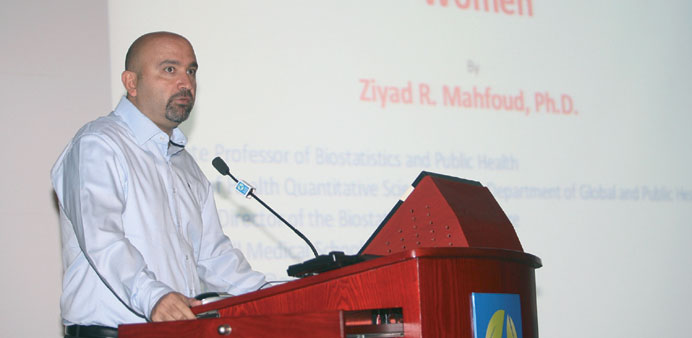By Noimot Olayiwola/Staff Reporter
A study has found an alarming exposure to second-hand smoke from cigarettes and shisha among pregnant Qatari women both inside and outside their homes.
The global prevalence of second-hand smoke among pregnant women shows Qatar in the third place at 80% after Greece (95%) and Jordan (82%).
The study, conducted among some 357 pregnant Qatari women between December 2011 and May 2012, finds that 32.8% and 17.4 % of their husbands smoke cigarette and shisha respectively. None of the women surveyed was a smoker.
Up to 31.9% of Qatari male population are smokers, according to the World Health Organisation (WHO) 2012 figures.
The objectives of the study were to estimate the prevalence of smoking and exposure to second-hand smoke during pregnancy among Qatari women; and to estimate the level of knowledge of health risks and attitudes towards tobacco smoking among those women.
The WHO says tobacco causes more deaths than human immunodeficiency virus (HIV), illegal drug use, alcohol use, motor vehicle injuries, suicides and murders combined. Tobacco kills about 6mn people a year worldwide.
“Second-hand smoke exposure is linked to cancer, cardiovascular and pulmonary diseases and it is estimated to have caused more than 600,000 deaths in 2004 with 28% of those deaths among children and 47% among females, including pregnant women,” according to the WHO.
Presenting the findings of the study at a symposium held yesterday to mark the World No Tobacco Day, which is observed today, Weill Cornell Medical College in Qatar professor Ziyad Mahfoud explained that smoking or exposure to second-hand smoke affects the mother, the pregnancy and the foetus causing low birth weight, premature rapture of membranes, placental abruption, preterm delivery, still birth and sudden infant death syndrome.
The study found that about 24.3% of women claimed to be exposed to second-hand smoke inside their households while 74.8% were exposed to the smoke outdoors with 7.3% of them getting exposed to second-hand smoke daily and 53% said they were exposed at least once a week.
“62% of our respondents claimed that sources of exposure to second-hand smoke inside the household is their husbands while others living in household exposed about 27% and visitors also exposed about 27% to second-hand smoke,” he said.
When asked about attitudes to second-hand smoke, some 22.6% women said they asked their husbands to stop smoking and 41.6% said they might ask a stranger smoking in their vicinity to stop while 25.9% said they took no action, according to the study.
Some 71.8% women did not allow smoking inside their homes and 16.7% of women’s gynaecologists discussed smoking-related issues with them.
Also making a presentation on ‘Tobacco Control in the State of Qatar’ at the symposium, HMC Smoking Cessation clinic chairman Dr Ahmad al-Mulla said that the clinic, which opened in 1999, presently sees more than 1,000 new patients each year in both Out-patients clinics and at heart Hospital three times a week.

Prof Mahfoud giving the presentation.
